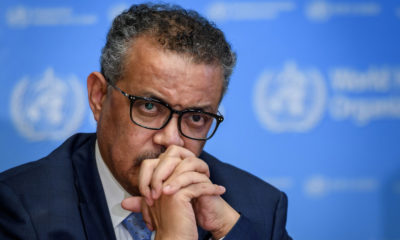World
Do more for migrants, Ban urges Europe

New York: European leaders should increase their efforts to help the hundreds of thousands of migrants fleeing war and poverty in the Middle East, Africa and Asia, UN Secretary General Ban-Ki Moon has said.
“I commend the leadership and global solidarity the European leaders are showing, but at the same time, in view of the gravity and the scale of this crisis, I would naturally expect that European leaders should do more,” AKI news quoted Ban as saying on Friday.
“Migrants and refugees should be treated humanely, responsibly, under the international refugee convention, international humanitarian laws, and international human rights laws,” he added.
“I am urging European leaders to open borders and provide necessary, life-saving humanitarian assistance: we have to show compassion to these people,” Ban said.
Ban made the remarks ahead of Pope Francis’ visit to the UN in New York on September 25, when the pontiff is expected to put Europe’s spiralling crisis at the centre of an address to the world body.
In an interview, Ban thanked Pope Francis “for his compassionate leadership for peace and humanity”, calling the pontiff “a man of moral voice, and purpose”.
Over half a million asylum-seekers have reached Europe already this year, in what the EU has called the worst refugee crisis since World War II.
In a bid to ease the crisis, the EU Commission chief Jean-Claude Juncker proposed a controversial quota system to redistribute 160,000 new arrivals around the bloc, described by Germany as “a drop in the ocean”.
World
Lockdowns in China Force Urban Communities to Defy Censorship and Vent Frustration Online

Shanghai’s rich middle class is leading a wave of online dissent over the strict and prolonged lockdowns imposed in various parts of the country. Chinese internet censorship is struggling as patience is wearing thin in many urban centers, coming up with creative forms of online protests.
Social Media Posts Revealing Lockdown Tension in Shanghai
Drawn-out lockdowns are nothing new in China as authorities insist with the nation’s zero-Covid policy since the start of the pandemic. Currently over This time around, however, metropolitan areas like Shanghai are increasingly difficult to keep quiet, given that its more than 25 million residents have seen weeks of total isolation along with food shortages and many other service interruptions.
Dozens of towns and reportedly over 300 million Chinese citizens have been affected by lockdowns of different severity. As expected, urban netizens have been most outspoken over their difficulties by finding creative ways to get around state censorship and bans placed on topics, news comments and spontaneous campaigns.
Shanghai residents have been using mobile proxies and hijacking seemingly unrelated hashtags to talk about healthcare issues, delivery failures and the overall severity of their situation. The “positive energy” that the Chinese government wants to transmit during the recent prolonged series of lockdowns does not come naturally to those counting food supplies and online censors are working hard to filter words, trending topics and undesired social media sharing.
WeChat groups and message threads are under constant monitoring. Posts questioning the zero-Covid approach have been quickly deleted, including by leading Chinese health experts like Dr. Zhong Nanshan. Video footage is soon censored and protests and investigations are quickly made to disappear.
Where this has not worked, officials have exposed banners with warnings and outright threats like “watch your own mouth or face punishment”, while drones have been patrolling the city skies. Yet, if anything, this has led to further tensions and unspoken confrontation with Shanghai’s educated and affluent middle class.
Creative Online Solutions Harnessing Civic Energy
Announcements by Chinese social media that they would be publishing the IP addresses of users who “spread rumors” have not helped either. Tech industry research has shown that much of Asia’s tech-savvy population has a habit of using mobile proxies and other privacy tools, quickly finding workarounds to browse the internet freely and talk to the world about the hottest topics.
The sheer volume of forbidden posts is already a challenge for the very censorship system, experts explain. Unable to track all trending hashtags, state workers overlook topics that speak about the US, Ukraine or other popular news. Linking human rights elsewhere to their situation, Chinese online dissidents establish their informal channels and “hijack” the conversation to share personal or publicly relevant information about the Covid suppression in their town.
Sarcastic and satirical posts still dominate. Others hope to evade the censors by replacing words from famous poems or the national anthem. One thing is certain – social media, when harnessed with the right creativity, has proven its ability to mount pressure on the government in even some of the most strictly controlled tech environments like China.























